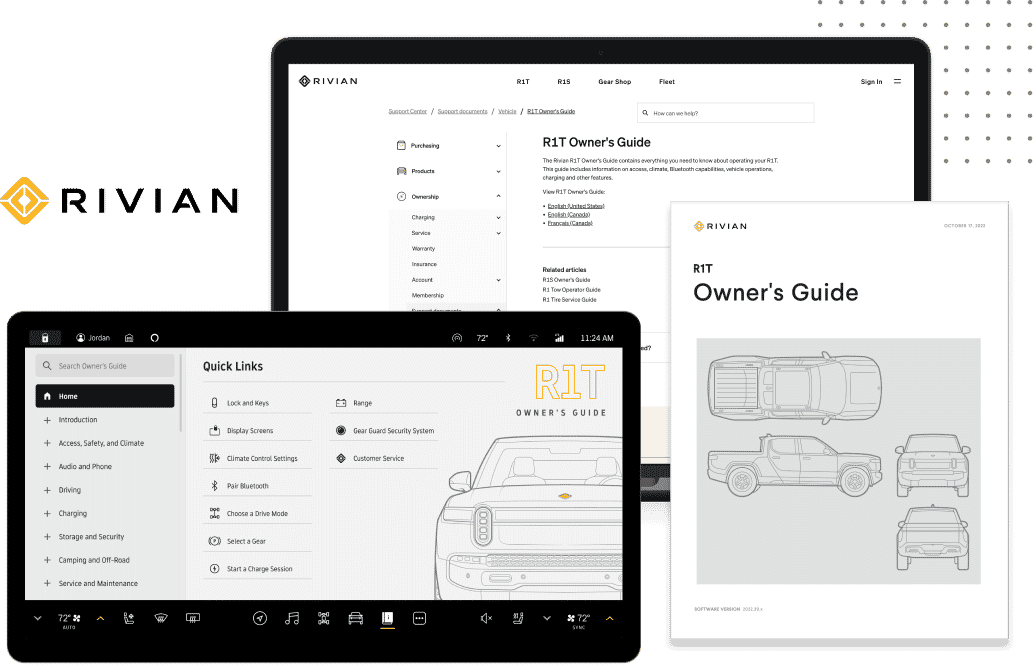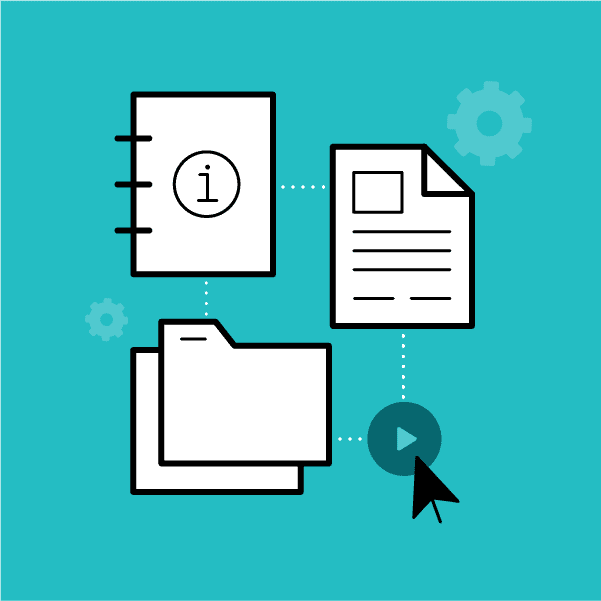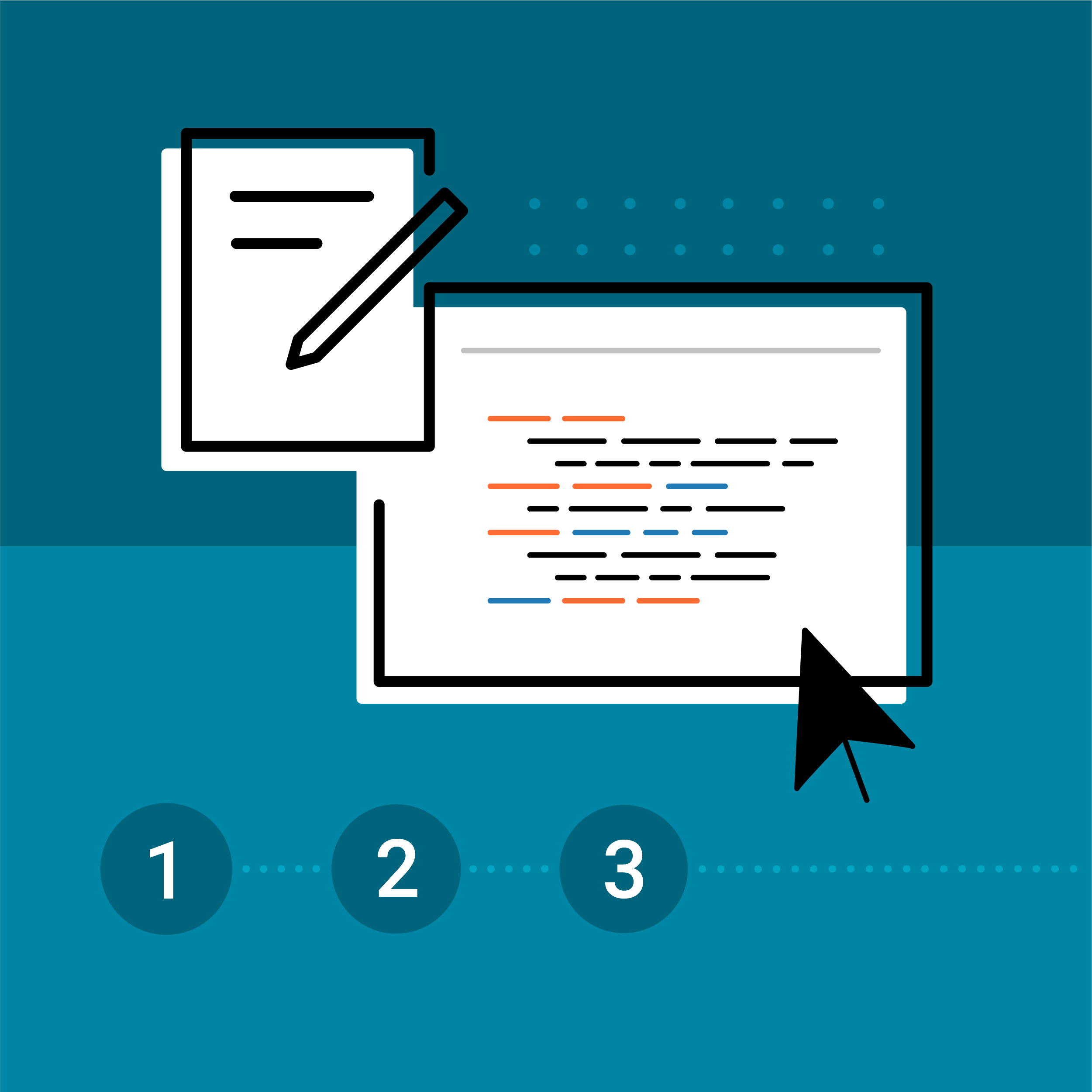This guest blog post was written by Marie Girard, a service design and content specialist who leads B2B organizations in the creation of successful customer experiences. In her current role as Head of Marketing & Customer Experience at Lemon Energy, a GreenTech startup, she defines business processes and content models to help the organization scale through customer experience management. She is a long-time yoga and mindfulness practitioner, she nurtures the ties between introspective practice, writing, creativity and strategic thinking.
Hiring Criteria for Technical Communicators
Each year, the Université Paris Cité organizes a job dating session for bachelor's and master's students to earn an internship in technical communication. This year, I participated in this event as a recruiter. When I went through the process of interviewing candidates, checking CVs, and conducting further interviews, I realized that we do not often talk about how we are hiring in terms of candidate selection and the recruitment process. Therefore, I decided to find out more and gather best practices for both hiring managers and candidates.
These types of insights are useful for managers who often lack the time and resources to streamline their recruitment process. It is also important for them to compare candidates with consistent criteria that they can develop according to the changing needs of their organizations and industry. A well-defined recruitment process makes it easier to hire technical communicators with the right skills, experience, and qualifications for the job, which leads to job satisfaction and retention.
For candidates, understanding the expectations of potential employers helps them tailor their applications and prepare for interviews more effectively, anticipating questions they could be asked and develop responses that highlight relevant skills, experience, and qualifications.
Understanding existing practice: a survey
I shared a survey with all managers who had hired interns from the technical communication programs of the Université Paris Cité in previous years and distributed it on related LinkedIn groups. I received thirteen replies that, despite the low volume, uncovered some interesting insights. Most of the respondents were from France, and some were from the UK, Ireland, and India. The conclusions, therefore, focus more on the French technical communication job market.
While most hiring managers who responded came from the software industry, there were also representatives from the life sciences, welding, and fire safety.
Most respondents reported managing small teams of 1 to 4 people with a 1 to 50 + ratio with experts. On average, they handle a little less than one hire a year.
The roles these hiring managers seek are mainly technical writers (55%), followed by learning designers (23%) and knowledge managers (9%).
The survey included questions about:
- Job descriptions
- Attention grabbers and showstoppers in applications.
- Expected soft skills and hard skills.
- Effective interview questions
- Tests
Based on the answers I received, I was able to draw up a typical job description of a technical communicator and the three most important qualities candidates should demonstrate. For each of these three top qualities, I have collected best practices for screening and interviewing candidates.
Technical communicator profile
Managers describe a technical communicator's mission as:
- Communicating complex ideas simply.
- Writing clearly and concisely for the best user experience.
- Ensuring optimal sharing of knowledge.
- Improving the usability of products.
- Increasing adoption and improving onboarding through language.
The tasks that technical communicators are expected to perform are (from the most frequently quoted to the least frequently quoted):
- Review and edit content.
- Collaborate with engineers, UX designers, product managers, technical support, and other stakeholders.
- Update documentation.
- Understand users, research user journeys, and promote a user-centric approach.
- Maintain and improve documentation processes.
- Manage publication architecture (XML).
- Collect information to understand the product and become a product SME.
- Manage translation.
- Document new features and write varied deliverables.
- Create graphics and videos.
- Define terminology.
Expected hard skills correlate with the tasks listed in the job descriptions:
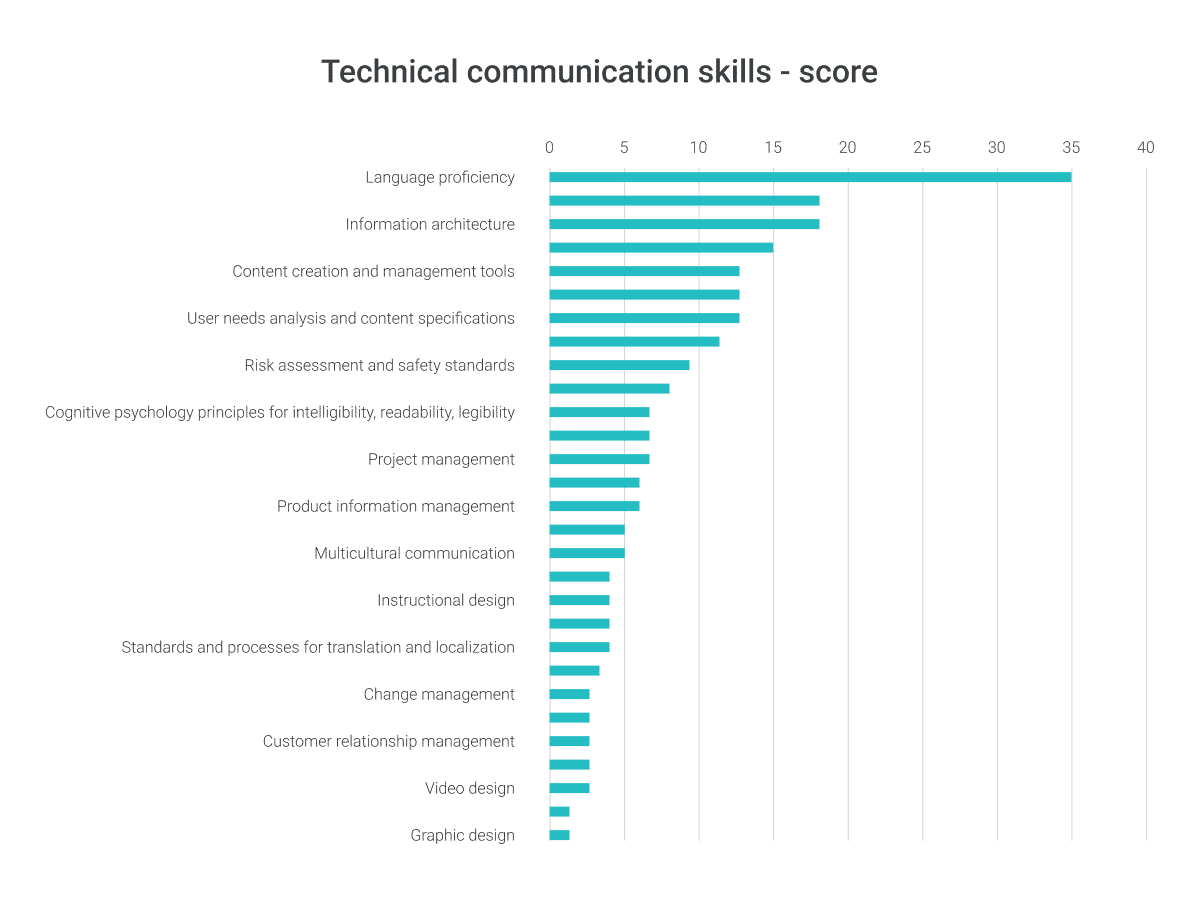
When communicating with candidates, it is important that hiring managers are transparent about the challenges associated with the perception of the job. One interview question quoted in the survey helps identify the candidate's perception of the job:
Imagine what a day is like in this job.
This question helps understand what is important for candidates and what their worries are. It is also a way to put them at ease while checking if there is a good match.
Soft skills play a significant role in technical communication. The most important personal attitudes cited were interpersonal skills, critical thinking, autonomy, and teamwork.
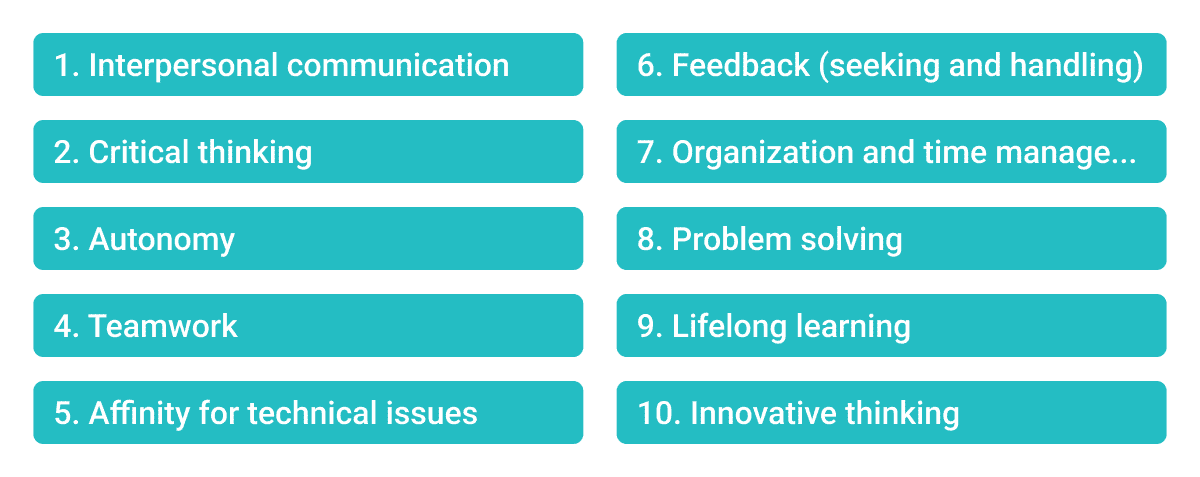
Some managers ask candidates to perform soft skills and cognitive tests before they meet for an interview.
During the interview, recruitment managers can ask questions such as:
What did you like in a previous experience?
Even if previous experience has nothing to do with the job, this question helps identify people's soft skills.
Which skills did you develop in a previous experience?
This question is about assessing how people perceive themselves to discover their soft skills.
Managers look for three main qualities in a candidate: language proficiency, appetite for technical environments, and adaptability to user needs and communication styles. Each of these qualities can be assessed through interview questions and tests.
Top three qualities
Language Proficiency
Language skills are at the top of the list in the eyes of hiring managers, which is not surprising. They expect excellent knowledge of English and sometimes Simplified English. Language proficiency extends to knowledge of languages other than English and to markup languages (HTML, XML).
Quality of language being such a strong focus, spelling mistakes, poor style, and lack of fluency in spoken English are absolute showstoppers in a candidate's application.
When examining a candidate's education, hiring managers usually look for bachelor's or master's degrees in technical writing or translation. If the candidate has a technical background, hiring managers look for writing experience.
Recruiters test language skills in several ways:
Editing
The candidate reviews a piece of documentation that has been changed. This test is intended to check whether candidates can detect incorrect writing and rewrite the text to improve it.
Writing
The candidate is given a subject and must write a procedure for it. This test helps assess writing, information organization, and analytical skills. Other checks can focus on whether they add screenshots or imitate the style of the company documentation. Some recruitment managers ask their teams to test the procedure written by the candidate. Depending on the role, some hiring managers also include structured writing within DITA XML.
Samples
Candidates are asked to provide a document they have written. This can prove complicated due to confidentiality issues, and there is no way to be 100% sure that the candidate was the author of the submitted piece of work.
Appetite for technical environments
Curiosity and willingness to work with experts come second. Managers are looking for people willing to learn new things, with the ability to think, question, and learn quickly. Knowing how to run research and conduct expert interviews independently is crucial.
Managers value experience in various professional roles, project management tools, and technologies (MadCap Flare, JIRA, Git, for example). Motivation is key: even if the person does not have technical knowledge in the field, it is the potential for progress that matters.
Inconsistent previous experience, not asking questions about the job, looking like they know it all, and showing no interest in technical areas are all showstoppers.
In interviews, hiring managers ask the following questions to test a candidate's appetite for technical environments:
Give an example of how you overcame a problem at work.
This question highlights the candidate's problem-solving skills: handling SMEs, managing deadlines, reacting to setbacks, and so on.
What did you find motivating in our offer?
This question helps check whether the candidate has done some research into the company and the job.
Do you have questions?
A common question that contributes to revealing interest in the role and technical area. Some tests can also help assess someone's ability to research technical issues:
Content creation
The candidate is asked to add a new section to existing documentation. During this three-week assignment, they can call and ask questions. The working notes and the process of creation are more important than the result.
Translation
Candidates translate existing product content from French to English. This test highlights the candidates' research skills in a technical area, in addition to their level of English.
Adaptability to user needs and communication styles
Technical communicators need to read the room and adapt their communication style to a particular target audience. Managers value experience working abroad or working within international teams as proof that candidates can adapt their interpersonal communication to different stakeholders.
Clarity is of the utmost importance, so candidates must pay attention to detail and present information clearly in their applications.
For this reason, the overall presentation of the CV is important in the eyes of the recruiter, with a clear format and concise explanations of previous experiences.
Bad layouts, wordy paragraphs, wrong style, inappropriate jokes, "creative writing" or "marketing writing," and incorrect product or organization names make a bad impression on an application.
Some questions that may come up during the interviews are:
Tell me about yourself.
This common question, which usually begins an interview, shows the candidate's ability to synthesize their background, knowledge, and experiences.
What do you think is most important for users when they read the doc?
This question helps determine whether the candidate thinks of content or presentation first.
What are the qualities of a good technical communicator?
This question checks that candidates have good knowledge of the job and can adapt their answers to this understanding.
As a further test, some recruiters ask:
Interview takeaways
The candidate is asked to write a summary of the takeaways from the first interview. This tests not only their language skills but also their ability to synthesize and organize their thoughts, as well as their main motivations.
Content design
Given a PowerPoint of an existing classroom training, the candidate is tasked with proposing ideas for converting it into training modules.
Evaluation
The candidate is provided with a copy of existing documentation and asked to evaluate it from the user's point of view.
Conclusion
It is important to share our recruitment practices. One of the recommendations given in the survey is to conduct interviews with a senior technical writer and work with other managers on recruitment. Comparing working methods and viewpoints makes the recruitment process more effective. These best practices help strengthen the way we position our profession and attract the right candidates.
This is not only about hiring or looking for work but also about making informed decisions about job changes, promotions, and career development opportunities.

